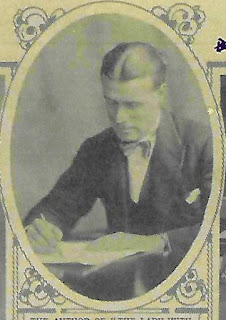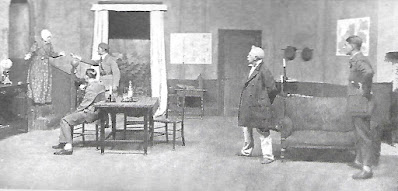REGINALD BERKELEY
The meaning of the title “French Leave” dates to 1771. Its originally related to guests leaving a major
social event without saying goodbye to the host and/or hostess. The military meaning of the term refers
to a leisurely absence from a military unit.
During the early summer of
1920, French Leave, was performed for four weeks in small cities and
towns throughout the English countryside. This comedy opened at London’s Globe
Theatre on July 15, 1920 and later transferred to the Apollo Theatre where it
played for a total London run of 283 performances. It was later reported in British newspapers
that the play was “honoured by a visit from every reigning monarch in Europe.”
French Leave is
a three-act play requiring six actors and two actresses. It is set “Somewhere in France.” The setting
for Act One is the sparsely furnished Mess Room for battle fatigued British Officers
of a designated Brigade resting out of the line. It is situated “in a ramshackle French house
in the village of Bogusvillers.” This
dwelling serves as the resting accommodation or Headquarters Mess for any British
Brigade that is in this area and on a few days leave from battle.
Dorothy
is the young, beautiful wife of Captain Harry Glenister. She has come to France to spend a weekend
with her husband while he is on leave. They were supposed to meet in Paris, but
his unit’s city leave was cancelled. Instead Glenister’s battalion is on rest
near the battlefield. Dorothy learned of his destination. She arrived early and
is posing as “Mademoiselle Juliette,” the daughter of the French woman who owns
the officers temporary dwelling. During
this act the three other officers who are at the house with Glenister, all meet
the attractive daughter of Madame Denaux. All the officers are smitten. There
are also two Mess soldiers with the officers, and the senior Mess soldier is
key to guiding the evolving situation before it reaches a serious conclusion.
Act Two is in the same room and it is after dinner. Dorothy has joined the Officers and one is being overly aggressive while vying for her attention which aggravates Glenister. The latter part of this act borders on becoming a full-blown farce since several male characters are sneaking around in the dark to find Dorothy.
Act
Three takes place the next morning in the same room. Eventually the truth is revealed that the
“Landlady’s daughter is Captain Glenister’s English wife. Brigadier-General
Root must act with prudence over the situation, and he determines that Dorothy
must be sent back to Paris under military escort. Captain Glenister is
designated for that assignment.
The
production at the Apollo Theatre starred Renee Kelly (1888-1965) and M.R.
Morand (1860-1922). While French Leave was still playing at London’s
Apollo Theatre, it was produced in the United States by Marc Klaw (1858-1936).
It opened in New York City at the Belmont Theatre after a short tryout run in
Boston. Mr. Charles Coburn (1877-1961) and Mrs. Charles (Ivah Wills) Coburn (1878-1937)
starred in the production. He played
Brigadier-General Archibald Root and she played Mlle. Juliette (Dorothy). This
production played at the Belmont for fifty-six performances.
While
French Leave was not a major success in the United States, it continued
to be popular in theatres throughout Great Britain. A new London production of French
Leave opened during January 1930 at the Vaudeville Theatre. This play
continued to be presented throughout the country during the entire decade. It
even changed a 300-year-old tradition at St. John’s College, one of the
thirty-one colleges at the University of Cambridge, when the Mummers presented
their annual play. Males had always played the female roles, but Dorothy/Juliette
was played by an actress.
A
film version of French Leave was made in 1930 by D & H Productions,
a British Film Production Company. It was distributed in the United Kingdom
immediately before playing in the United States in 1931. Madeleine Carroll (1906-1987) starred as
Dorothy and the leading male role went to Sydney Howard (1884-1946) who played
the same character Charles Coburn had. Haddon Mason (1898-1966) played the husband,
Captain Harry Glenister. This film was directed by Jack Raymond (1886-1953).
On
February 28, 1940, it was reported in the “Aberdeen Evening Express” that French
Leave was one of the first plays to be sent to the British Forces fighting
in France during World War Two. This tour was scheduled for two months.
PHOTO: This photo appears in the 1922 Samuel French published edition of the script. Madame Deaux was played by Anna Russell (????-????)


No comments:
Post a Comment